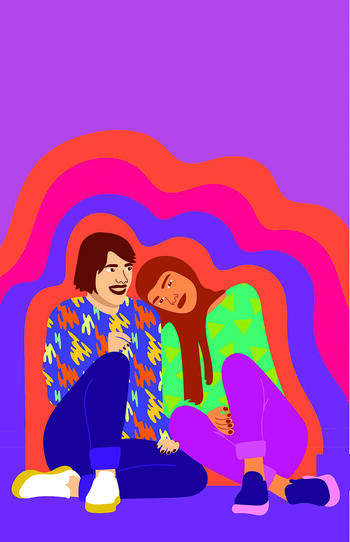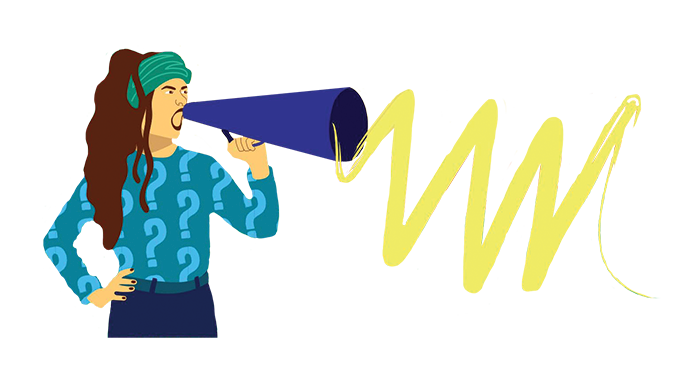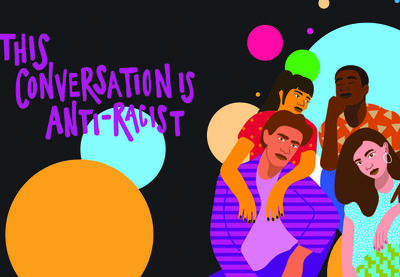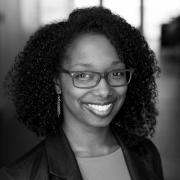Tiffany Jewell hadn’t really thought about writing a children’s book when an editor approached her about one in November 2018. This editor had learned that Jewell had been doing anti-racist work with elementary students for nearly two decades, most of that time spent as a Montessori educator. Their initial exchange, followed by a fruitful editorial relationship, is part of the origin story for This Book Is Anti-Racist: 20 Lessons on How to Wake Up, Take Action and Do the Work—which Jewell wrote in three and a half months.
When I asked Jewell to share more about this origin story, she told me that phrase “makes [her] feel like a superhero.” I don’t think she’s far off. This book is informed not only by thoughtful self-reflection but also by many years steeped in exemplary education, relationship-building with young people and dedication to dismantling white supremacy. When we talked—just four days after George Floyd’s murder and early in this year’s uprisings—that dedication was on full display.
So she does what many superheroes do: She uses her abilities to leave the world better than she found it and to help the next generation tap their (super)powers to do the same.
You state in the introduction that this book is meant to be read in a set order and that the design is deliberate. Will you talk about that?

It followed the pattern of the work that I always did with my students. Because I tried a bunch of different things. So sometimes I tried to jump right into the history and that didn’t work, or sometimes I jumped right into action and that didn’t work. And so really wanting folx* to really do work on their inner selves first and understand their own identity and positionality. And then once you know who you are, then you can start to know more about the world around you.
So knowing the history of what came before you, the side of history and the anti-racist side of history. Because it’s really important to amplify that resistance has always been part of us. And then from there, once you know the history and you’ve done deep analysis and understand what’s going on, then you can jump into action and understand how to work in solidarity with other people. But you can’t do that if you don’t know yourself, if you don’t know where history has led you to.
There are a number of definitions of anti-racism out there right now. Can you state the definition of anti-racism that you’re using?
When I think of anti-racism, anti-racists are people who oppose the systemic misuse and abuse of power by institutions that lead to us having those personal biases and prejudices against each other. That foundation is there. An anti-racist person is somebody who is actively working for a society where we aren’t oppressed because of our differences, where every person gets to be their whole self and honored for that.
When you think back to yourself as a young person—and I love the way you include these vignettes from your own childhood throughout the book—what would having this book have done for you or meant to you?
It would have been awesome to see somebody like myself in a book because that didn’t happen until I was in my early 20s, as a Black, biracial person. Also, it would have given me the language to understand what I was experiencing around me.
Because I saw injustice. I knew it was there. But I didn’t have that language. Nobody said, “That’s racist!” Also, because I wrote it thinking about me and “What would 9-year-old and 14-year-old Tiffany really do with this?” It would have helped me stand up stronger against my teachers and against the systems in our school. As I got older, like in high school, I was able to do that with a little more strength, but I still didn’t have that language that the adults kept really close—like they held on to it and they didn’t share it with us. They didn’t want us to have it.
What is it that you hope young people understand about power? Not only the power outside of themselves that they are working against, but the power within them.
I want young folx to be empowered. I want them to know that they have agency.
Recently, I did a workshop with the organization Be the Bridge, and they had this conference for young folx. And one of the young white kids in the group, he was like, “My parents: They’re nice people, but they don’t understand why I need to talk about racism.” And he was like, “I don’t know what to do.” And what I want is for young folx to know that even if your family’s not ready for you to take this journey, you can do it. You can absolutely have a different viewpoint than your family. You can be the one that shifts your family’s thinking in the actions that you do.
Young folx don’t have to wait for the adults because the adults will always talk themselves out of something that’s uncomfortable. I see young folx. They’re able to dream bigger. They’re able to really just kind of go with change or create change. And so, really, I want them to know that they can do this.
What would you like young people to think about their education, what they’re actually being taught, as a result of reading this book?
We as a family just finished reading the book Tristan Strong Punches a Hole in the Sky. … I’ve been thinking a lot about how that story relates to whose stories get told. It’s all about a storyteller, a kid who has the gift of telling stories. ... The part that really struck me is towards the end where Tristan Strong agrees to tell the story—everybody’s story. He’s not just going to tell it one-sided. He’s like, “I need to tell this part, too.”

And that’s what our students need. They need those stories. You know, I never learned anything about Malcolm X—other than we shouldn’t talk about him—until I read his words on my own. And I never learned about the Black Panther Party and, like, we got free breakfast because of them!
There’s so much that’s hidden. I didn’t learn about the MOVE bombing until decades later when I was living in that neighborhood in West Philadelphia. … And those things, our kids can handle them, and they need to know them and they need to know how we stood up. …
The people who control the stories don’t want us to know those parts. And so, you know, students knowing just those little bits from the book, hopefully it sparks their curiosity and they’re like, “I need to know more” and, “What we’re learning in our American history class—it’s totally one-sided.” Or just be able to speak up about that and get their parents because parents have a lot of power in schools.
What do you hope educators take away from this book?
I really want educators to know that you have to address injustice. Like, you can’t push racism aside. That our kids see it. They know it exists. And so we can cultivate a community where we’re discussing it and diving into it and understanding it courageously.
I think that is really important. I also think it’s important for educators to not feel like they are the ones that have to give all the information. It’s OK for us as adults to not know and to pause and listen to students. We really need to—as teachers and educators—we need to let go of our egos and really work collaboratively with our students, which doesn’t happen a lot. And I hope, with this book, they’ll be doing that work together.
Given the pandemic and this summer’s protests, I think it is really important that we’re having this conversation right now about anti-racism. Is there a particular message that you would like to send to young people and perhaps to educators about their power to engage in anti-racism right now, with the current state of the world?
Folx who are able to spend time with the book, do the work on your inner self right now. Because when we start emerging into community, community is going to need community. We have to take care of each other, and we can’t do that if we haven’t done the work ourselves. Then we just turn into a “savior.” …
Spend a little time learning from people who are out of your comfort zone. You know, if you’re a white educator, listen to Black women. Listen to Indigenous women. If you’re cisgender, spend some time listening to trans folx. … It’s time to expand yourself a little bit, to go a little beyond, and also to challenge other people. If there’s somebody in the group who is saying something sexist or racist or homophobic, challenge them.
[Online communities are] great practice for us to do this challenging work. Because when we get out into public, then we’re with people and it feels different. But if you practice it, you’re like, Oh, I can call that person out on their racism, no problem.
Practice is another important thing that you place in the book. Like, What would I do if I witnessed someone being unfairly treated by a police officer?
Unfortunately, this is coming up all the time. And the thing that I’ve been doing with my own children who are 8 and 4—the ages that many people deem are too young and they’re not—[is] really teaching them how to witness.
Like, “What do you notice? How many cops are there? How many cars? Do they all have a different car? Where are they going? … What do you hear?” And really asking them to notice those things because my children are white-presenting. They walk through the world through their white bodies, and they’re going to be believed over many other people. So really getting them to practice that and then to talk about what they see and to question. …
Reading books, too, and questioning authors and looking at, “Who wrote this book? Is this the right person to be telling this story right now?” …
But there are so many things as parents we can do—and teachers and educators—to be encouraging: talking with their students and families about this, to practice witnessing, practice talking, practice asking questions.

We were just talking about being “old enough.” So even if they’re not old enough to vote yet, what do you want young people to understand about the power of their voices when it comes to elections and other decisions that affect their lives?
This is the thing that I hear most from young folx—13-, 14-, 15-year-olds that are like, “I can’t vote.” And so some of the things we talk about is really kind of breaking down what those systemic [misuses and abuses of power] are within our institutions and being very vocal about them, especially in the realm of education, which is the institution that so many of our young folx are entrenched in. To really use their voices to speak up against it and to really talk with the adults in their lives, like, “You are not voting for yourself. You are voting for me. This is what I need.” I think it’s really important.
And then, a lot of the young folx that I’ve talked to, they’re like, “I want to go out and stump. I want to go out and campaign.” They’re really excited and want to do that work, too.
So I really want politicians to open up those spaces because we have the energy of young folx. We can do so much more. And we need to be working with them because they’re the folx who we’re making all of these changes and policies for. …
The other thing I always like to remind young folx, I’m like, “You have to be 35 to be president, but there’s not a cap on age to be the mayor,” and pointing out some of the younger mayors. … You can effect change! Senate, Congress. There’s so many [ways]. There’s so much in the world of politics and elections: school board, library board. … Those don’t have an age cap, and there’s no reason why they couldn’t run.
Is there anything else that you’d like to share about this book or about young people’s anti-racism that we haven’t gotten into yet?
I love doing anti-racism work with young folx. My dream is that it becomes a part of our schools everywhere. So we have this new generation of folx who just understand it. …
Every time I do this work with young folx, it’s super clear to them. They’re ready to dig and do the work and to see and envision what a world without racism looks like. And adults are like, “But this is how it’s always been for 400 years! It’s going to take that long to dismantle it.” …
And I think young folx are really good at envisioning what we’re fighting for and have that imagination. As adults, we kind of block that away in ourselves and we’re just always fighting against things. We just kind of get tired, and we lose steam. We talk ourselves out of it.
Anti-racism work is all [about] moving us forward—understanding the history but moving forward.
You were saying you would love to see anti-racism work regularly happening in schools. So, for these adults who have talked themselves out of it or say it’s too hard, where do you think they can start?
For adults, I always go back to the goals of anti-bias education. And they’re for little kids … but they work really well for all ages. And they work well for ourselves.
And the first goal is all about identity and knowing who you are as an adult, and for kids, empowering them to love themselves. … How can we argue with loving yourself?
So that’s where we start, is to really learn how to love ourselves again as adults. And then for young folx … amplify and empower them and help them grow to keep loving themselves. Because it stops. Once you get to school, it’s kind of when you stop loving yourself.
And right now, it feels like it’s courageous. And what if it didn’t have to feel courageous and it was the way we always were?
TT Senior Writer Cory Collins provided editorial support for this interview.
*This is the spelling Jewell uses in This Book Is Anti-Racist. There, she explains, “You will notice I have chosen to use ‘folx’ instead of ‘folks’ because it is a gender neutral term created by activist communities, and I would like to honor everyone who reads this book. Replacing the ‘ks’ with an ‘x’ allows for every reader who has never been seen before to see themselves in here.”

